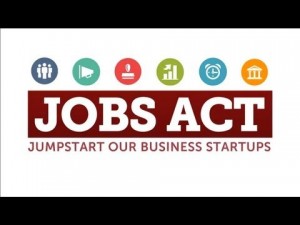 Rapidly moving legislation dubbed the Jumpstart Our Business Startups Act (JOBS Act) was passed Thursday, March 22, by the U.S. Senate. [It has since been passed by the House and is now on its way to the President for his signature.] The JOBS Act is expected to fundamentally alter securities laws. The business world is buzzing about the pros and cons of this Act. The Act is designed to invigorate the IPO market by removing restrictions on capital raising that many of the detractors of the Act believe are important for investor protection. The JOBS Act:
Rapidly moving legislation dubbed the Jumpstart Our Business Startups Act (JOBS Act) was passed Thursday, March 22, by the U.S. Senate. [It has since been passed by the House and is now on its way to the President for his signature.] The JOBS Act is expected to fundamentally alter securities laws. The business world is buzzing about the pros and cons of this Act. The Act is designed to invigorate the IPO market by removing restrictions on capital raising that many of the detractors of the Act believe are important for investor protection. The JOBS Act:
- Permits “crowd funding” (raising capital in small amounts from many people usually via the Internet to finance a start up);
- Eliminates the ban on public solicitation of investors by companies seeking financing in a private offering;
- Raises the offering ceiling for so called “Regulation A Offerings” from $5 million to $50 million;
- Raises the threshold for required registration as a public company from 500 to 2,000 shareholders (1,500 of whom must be “accredited investors” under the Regulation D standard);
- Raises the threshold for required registration as a public company for community banks from 500 to 2,000
- Creates a new category of securities issuer called an “emerging growth company,” defined as companies with annual gross revenues of less than $1 billion.; and
- Provides for a “securities on-ramp” to phase in costly SEC reporting and compliance requirements such as internal controls audits, Say-On-Pay votes, etc over a five-year period for “emerging growth companies”.
The JOBS Act was previously passed in the House by a wide, bipartisan margin (390 to 23) on March 8th, and by the Senate by a narrower, but bipartisan margin (73 to 26) today. Because the Senate adopted the House version with a slight amendment, the bill will be sent back to the House to be reconciled. We expect the JOBS Act to be signed by President Obama by the end of the month.
